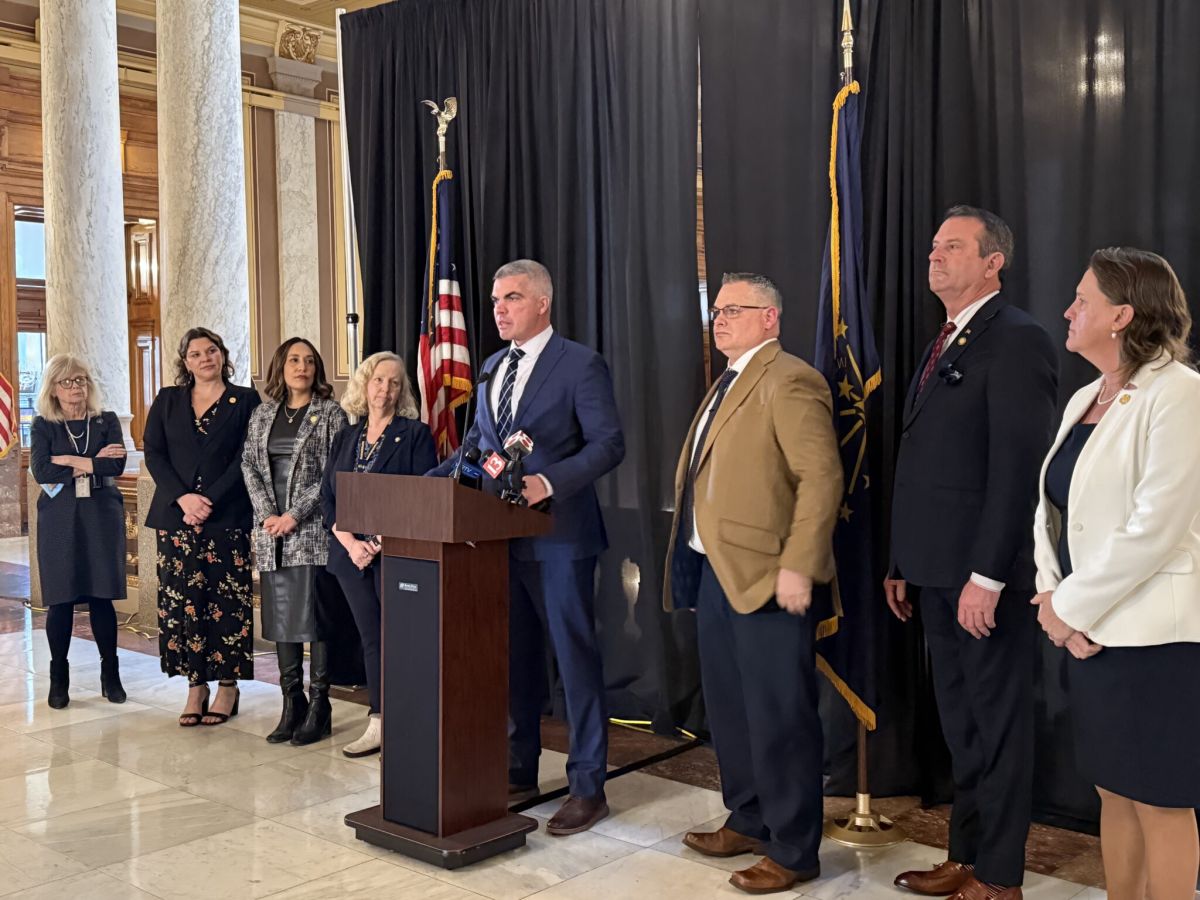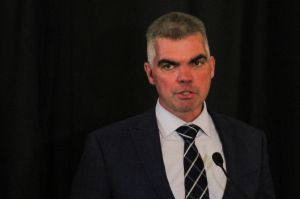
Rep. Bob Morris, R-Fort Wayne, and eight other lawmakers attend a rally on Monday, Feb. 3, 2025, at the Indiana Statehouse in support of Morris’ proposal to alter or abolish the death penalty in Indiana. (Casey Smith, Indiana Capital Chronicle)
Indiana Gov. Mike Braun suggested Monday he could reverse the previous administration’s unwillingness to disclose how much the state paid to acquire the drug used to execute convicted killer Joseph Corcoran.
The Indiana Capital Chronicle sued the Indiana Department of Correction (IDOC) Jan. 21 amid a months-long battle to seek taxpayer dollars spent on the execution drug, pentobarbital.
Before that, the law was broadly applied by DOC and former Gov. Eric Holcomb’s office to shield details about how the state obtained the drug. The law specifically bars release of the name, address or tax identifier. But cost is not included.
In a new statement, however, Braun’s team said the governor has now “directed his legal team to evaluate how to provide the greatest level of transparency under current law in hopes of resolving the current lawsuit.”
That came ahead of a small Monday afternoon rally at the Statehouse centered around House Bill 1030 — which seeks to abolish the death penalty altogether in Indiana.
The author, Rep. Bob Morris, R-Fort Wayne, said he hopes to scale back the bill to address the efficacy of execution drugs before they can be used, and alter rules around who can administer life-ending drugs and witness executions. Narrowing the proposal could give it a better chance at advancing through the legislative process.
“I would suspect that you may be seeing some amendments being filed in regards to the different aspects of the death penalty ending,” he said. “There are a number of ways that we can go about eliminating capital punishment here.”
He pointed out, too, that in states without the death penalty, “the reality is, crime is still happening.”
So far, the bill has yet to get a hearing in the House courts committee where it’s been assigned. Morris said he’s speaking and working with House leadership — as well as committee chairwoman Rep. Wendy McNamara, R-Evansville — to get the bill or relevant language into favorable form.
Death penalty bill gaining traction
Ahead of Joseph Corcoran’s Dec. 18 execution at the Indiana State Prison in Michigan City, Morris called on Holcomb to block that execution and death sentences for Indiana’s seven other death row inmates. The representative insisted then — and again on Monday — that “human life is sacred.
“This was the first time in my 15 years being elected that a person was executed,” Morris said at the rally. “And I looked at the other seven inmates currently sitting in our state prison that are set for execution, and I started to wonder how our execution process takes place, and how those prisoners got to where they’re at.”
Morris said he was particularly moved by a call he received from Corcoran’s sister, who offered a unique perspective — she was the inmate’s family, but also a victim. Corcoran killed her brother and fiancé.
Read more: Death row inmate Joseph Corcoran executed for quadruple murder
“She said, ‘Now the state of Indiana has ruined my Christmas forever,’” Morris recalled.
The convicted killer made repeated requests for his execution to be carried out, and he consistently rebuffed his legal team’s attempts to challenge the death sentence. Corcoran’s guilt was not in question, but his long-term mental illness was at the heart of efforts to block the execution.
Morris expressed confidence that lawmakers “will be looking at the mental health of the person at the time of the crime,” which could affect a person’s ability to qualify for a death sentence.
Of his “greatest concerns,” though, are the DOC employees tasked with carrying out executions or prisoners who “they spend many hours with — making sure they’re fed, and housed in appropriate conditions.”
“I don’t feel, personally, that we (should be) charging state employees with that duty,” Morris continued. “Why is that? Why is that happening?”
Among his anticipated amendments is one to prohibit state employees — like DOC staff — from being involved in future executions.
“The trauma and the guilt that many of them face from carrying out an execution, I just don’t feel that our state employees actually are volunteering for this,” Morris said. “And the state taxpayers are actually paying for their mental health after the execution, so that’s very concerning, too.”
Targeting execution drugs
The Republican lawmaker said he’s also looking to advance bill language to further regulate Indiana’s execution drug protocols.
“As we look further and down the road, the drug that’s being used to execute these prisoners — is it effective? It’s a compound. And the reality is, if you purchase this drug, the compound actually loses its strength,” he said, referring to pentobarbital, the newest execution to be used in Indiana.
Experts and advocates note, for example, pentobarbital can expire and should not be used if the drug isn’t stored at a proper temperature.
Many of the documented botched executions in recent years have occurred because the drugs being used had expired, were contaminated, or they were administered “incorrectly,” according to the Death Penalty Information Center.
Indiana officials have refused to say how much additional pentobarbital the state has in storage or when it’s set to expire.
Need to get in touch?
Have a news tip?
“Suffering of a person is the last thing that we need to be worried about, as far as the state of Indiana goes,” Morris continued. “I’m a pro life legislator. I know a number of my colleagues up here today are pro life legislators, as well, and we’re taking the life of a human being.”
A pending amendment Morris offered on a separate bill seeks to require that Indiana State Police test pentobarbital between 12 and 24 hours before an execution to ensure the substance is “100% effective” before it’s administered.
Also up for debate is the “very small” witness room to the execution chamber that gives only four or five people “limited” access to watch an execution through a one-way window.
Corcoran and his legal team allowed a reporter from the Indiana Capital Chronicle to witness the execution at the state prison. No other media were permitted to be present, per state law.
Morris said he’s exploring options to increase transparency around the execution chamber.
“If we’re really trying to teach an example to our youth and to others to stop doing these crimes, why are we not doing these executions in a stadium like Lucas Oil Stadium so everyone can see the person get executed, and everyone can learn an example?” he asked. “The reality is, executions don’t stop these heinous crimes.”
Morris was joined Monday by eight other legislators, including Democrats and Republicans from both caucuses.
In a letter penned by Rep. Victoria Garcia Wilburn, on behalf of the House Democrats, she said Morris’ bill “will realign our state’s commitment to the pursuit of justice.”
“I believe that this legislation strikes a balance wherein the person’s death sentence is commuted to a sentence of life imprisonment without parole,” Garcia Wilburn, D-Fishers, wrote. “Furthermore, it safeguards the risk of the potential execution of innocent people and prevents the collective trauma that is experienced by all people involved in an execution helping to ensure a morally well society.”
GET THE MORNING HEADLINES.
Indiana Capital Chronicle is part of States Newsroom, a nonprofit news network supported by grants and a coalition of donors as a 501c(3) public charity. Indiana Capital Chronicle maintains editorial independence. Contact Editor Niki Kelly for questions: info@indianacapitalchronicle.com.











